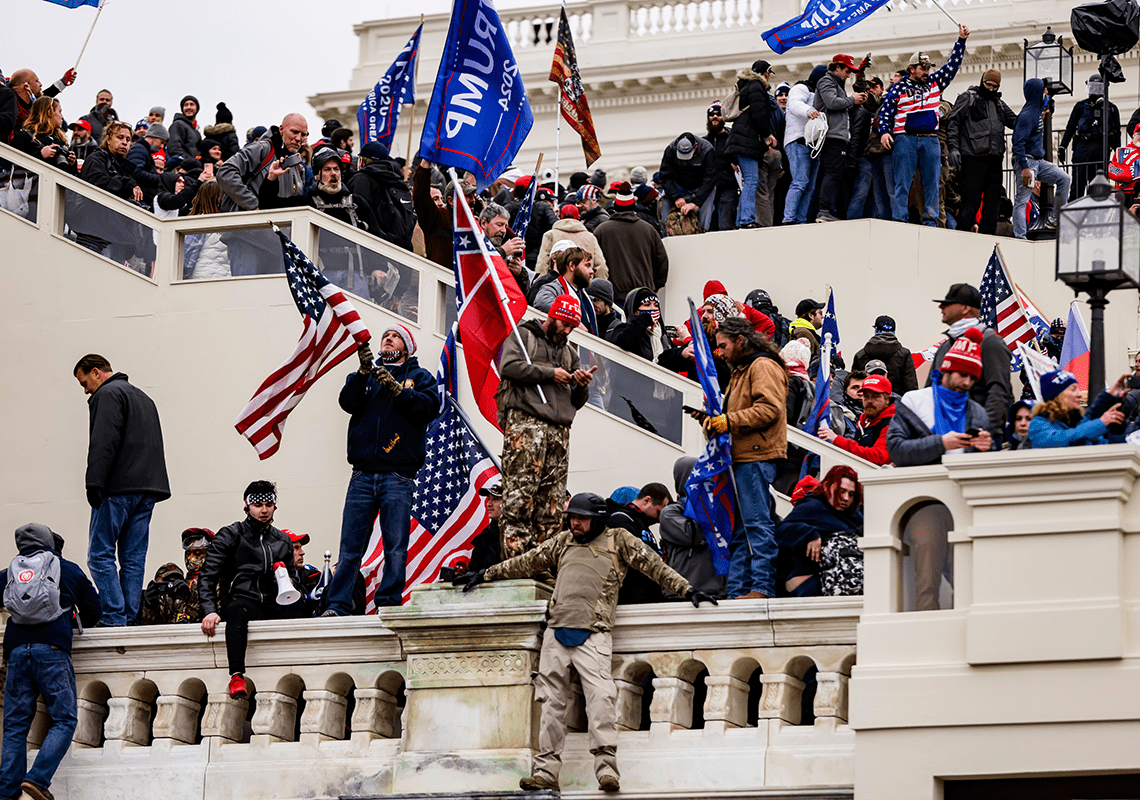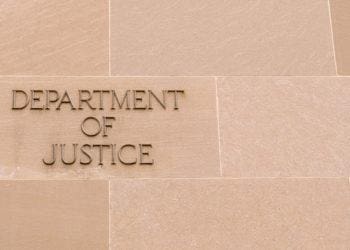Corporate America might be hoping that the difficult issues raised by President Trump’s attempted coup last week and the remaining days of his term will somehow pass them by. Too bad.
What Trump has unleashed isn’t something businesses will be able to avoid. In several practical ways, dealing with Trump and his minions — both right now, and after Trump leaves office — is going to require new corporate policies, and test corporate culture like never before.
My first sense of that came when I read a news story about Trump supporters flying from Dallas to Washington on Wednesday afternoon. The Trump supporters began projecting a Trump 2020 logo onto the cabin walls, and descended into shouting matches with other passengers. In at least one instance, the Trumpers called a black passenger “boy,” and they disregarded flight attendants’ demands that everyone calm down and remain seated.
The whole thing, like everything else these days, was caught on video:
And so it begins.
On a plane from TX —> DC flight attendants are struggling to control a plane full of Trump supporters as they display a pro-Trump projection and harass others passengers bound for DC.
[DM to license]#dc #trump #trumprally #protest #thisisamerica #sos pic.twitter.com/BlTCbD8ntl— Maranie R. Staab (@MaranieRae) January 6, 2021
The fights happened on American Airlines, and almost immediately the flight attendants’ union demanded that violent protestors be banned from boarding flights. I support that idea, but my question is this: How would we identify potentially violent protestors before they board?
Of course, if a Muslim man approached a flight decked out in a t-shirt with the ISIS flag logo, nobody would hesitate at what we’d do next. We would intercept that man, deny him boarding, subject him to interrogation by federal agents, and most likely put him on a terrorist watch list. That’s how we identify and handle potential international terrorists.
So — shouldn’t we do the same with domestic terrorists? And isn’t their identifiable garb the red Make America Great Again hat, along with various other pieces of Trump 2020 couture? To the casual eye, how different are unrepentant Trumpers from any other potential terrorist? You know them when you see them.
That’s the difficulty for corporate policies right now. We all know that anyone dressed as an avid Trump supporter is a potential insurrectionist. But to say the quiet part out loud — that Trump supporters are dangerous, that they’re nuts, that they betray American norms and should be kept at arm’s length — is something no company wants to do.
Except, by tolerating Trumpist views, we end up with violent mobs storming the capital of democracy; and last week’s mayhem was only the latest, most serious example of Trump supporters putting the public at risk. We’ve seen plenty of other examples over the last four years. We may see more yet.
So companies will have to address Trumpism somehow. That means corporate policies, and those policies will need to equate President Trump and his supporters with extremism. That’s going to alienate a significant portion of your employees, customers, and critics on social media: those pathetic 35 percent or so who still exalt Trump in all ways and at all times.
The Corporate Culture Challenge
Next I wonder how that fact will test corporate leaders. Plenty of them have already condemned Trump or even called for his immediate removal, but those are the table stakes for supporting American values. A true commitment to those values — values that transcend any single corporation’s ethical promises; values that provide the foundation for all else that Corporate America builds atop that ethical structure — is a strong repudiation of Trumpism in whole.
That will be hard, exhausting, difficult work. It means constantly reminding all employees whenever they drift near to the views of Trumpists and MAGA supporters, “that’s not what we’re about.” Good luck having that conversation, when the defining trait of so many MAGA extremists is that they won’t shut up about it. But it will still be necessary.
The Trump Challenge Will Endure
Let me close with another example of the practical challenges arising from Trump’s coup crisis.
As you may have heard, within hours of Trump’s call to insurrection on Wednesday and then his half-assed call for insurrectionists to go home, Twitter and Facebook suspended him from their respective platforms. Later Shopify announced that it had shut down the online stores that the Trump Organization and the Trump 2020 campaign ran on its platform. Then Facebook announced that it would leave Trump suspended from Facebook indefinitely, and at least until President-elect Biden takes office on Jan. 20.
So exactly when does Facebook reinstate Trump? Who makes that decision, according to what criteria? Is it a subjective decision made at the whim of Mark Zuckerberg? If Trump calls for insurrection again sometime in the future, would he be suspended again?
 What about Shopify? Yes, the company based its decision on policies that say retailers on the platform can’t support organizations that promote violence. So what’s the criteria executives use to make that ruling? What if Ivanka Trump or Donald Trump Jr. run for president in 2024 using the MAGA logo — does that qualify as a change in the organization, so the stores can go back online? What if someone like Sens. Josh Hawley or Ted Cruz embrace the stolen election nonsense as a campaign issue? Does the MAGA logo itself constitute a Shopify violation, or do the amoral political urges behind the logo?
What about Shopify? Yes, the company based its decision on policies that say retailers on the platform can’t support organizations that promote violence. So what’s the criteria executives use to make that ruling? What if Ivanka Trump or Donald Trump Jr. run for president in 2024 using the MAGA logo — does that qualify as a change in the organization, so the stores can go back online? What if someone like Sens. Josh Hawley or Ted Cruz embrace the stolen election nonsense as a campaign issue? Does the MAGA logo itself constitute a Shopify violation, or do the amoral political urges behind the logo?
My point is this: companies will need clear, strong policies and procedures to handle Trump and Trumpers in the future. Those amoral political urges aren’t going away any time soon. So while I approve of Shopify, Facebook, and Twitter de-platforming the insecure tyrant that Trump is (long overdue, I’d say), this is not the last time companies will go through this. We will still have that pathetic 35 percent raising hell against corporate decisions to oppose Trump and support America.
So you’ll need clear criteria, ample evidence, and rock-solid commitment to upholding American ethical values no matter how loud the loudmouths might get.
This post was originally published by Matt Kelly on Radical Compliance and is used here with permission.



 Matt Kelly is founder of Radical Compliance, which provides consulting and commentary on corporate compliance, audit, governance, and risk management. Radical Compliance also serves as Kelly's personal blog. As the long-time (and now former) editor of Compliance Week, Kelly writes and speaks frequently on corporate compliance, audit, and governance, and now works with various private clients to understand the those fields and to develop go-to-market strategies or provide other assistance in reaching audiences of compliance professionals.
Matt Kelly is founder of Radical Compliance, which provides consulting and commentary on corporate compliance, audit, governance, and risk management. Radical Compliance also serves as Kelly's personal blog. As the long-time (and now former) editor of Compliance Week, Kelly writes and speaks frequently on corporate compliance, audit, and governance, and now works with various private clients to understand the those fields and to develop go-to-market strategies or provide other assistance in reaching audiences of compliance professionals. 








